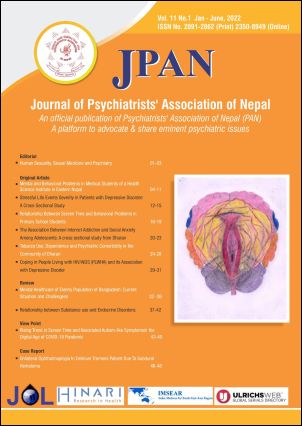Rising Trend in Screen Time and Associated Autism-like Symptomsin the Digital Age of COVID-19 Pandemic
DOI:
https://doi.org/10.3126/jpan.v11i1.53872Keywords:
Autism, COVID-19, development, parenting, screen timeAbstract
The COVID-19 pandemic came with stay-at-home orders, virtual classrooms, online family and social interactions, with consequential rise in preference of spending time on digital devices rather than in social interaction and outdoor play activities. This trend has brought challenges to today's parenting with repercussions on social communication development of children resulting in an increase in the number of children presenting with symptoms of autism. The postulated mechanism could be the screen-based developed neuroplasticity adversely affecting social salience neuronal pathways. Other contributing factors could be the hindrance of screen overuse on social learning, parent-child interaction and child's interests on off-screen activities. Positive parenting with structured routine of settng screen-free time and zones, behavioral modeling and substitution along with virtual access to child psychiatry services and interventions can mitigate the surging risk of associated autism-like features in today's children.
Downloads
Downloads
Published
How to Cite
Issue
Section
License
Copyright (c) 2022 Journal of Psychiatrists' Association of Nepal

This work is licensed under a Creative Commons Attribution 4.0 International License.
This license enables reusers to distribute, remix, adapt, and build upon the material in any medium or format, so long as attribution is given to the creator. The license allows for commercial use.




